Sam Curry
currysam@grinnell.edu

Photo by Sarah Ruiz
Being a coach at Grinnell College means having great opportunities, such as access to top-notch facilities and student athletes with strong work ethics, but also unique challenges, such as students’ busy schedules and the occasional temptation to cancel outdoor practice due to the overwhelming smell of manure outside. The ability of coaches to navigate these challenges and opportunities accounts for no small part of the success of a number of the College’s sports teams.
Although every one of them attaches some qualifying statement to it, Grinnell coaches are mostly willing to admit that, in order to maximize player performance and potential, they occasionally have to be stern, tough leaders. However, they all also admit that cooperation and player input also plays a crucial role in coaching success.
“My intent is always to be cooperative and have a teaching focus, but I have no doubt that authoritarianism slips into my interactions due to the pervasiveness of it in sport culture,” wrote Tim Hammond, assistant men’s and women’s swim coach, in an email to The S&B.
Erin Hurley, head coach of the men’s and women’s swim teams, also recognizes that she can be tough, but this is a result of wanting to hold her players to high standards, in and out of the pool.
“I think I’m relatively tough in that I have pretty high expectations for everybody, and it’s not just how they perform in the pool or on the boards, it’s how they conduct themselves on the team and outside of the team. Competing as a student athlete I look at it as a privilege, not a right, so given that, there are certain things that are expected of them,” Hurley said.
Like Hammond, Andy Hamilton ’85, head men’s and women’s tennis coach, adopts language from politics to describe the more controlling aspects of his coaching style, while acknowledging that as his coaching career progresses he has changed his style a bit.
“I think that at times I can be a little bit autocratic in that I have expectations, and it’s pretty rare that my players don’t fulfill my expectations, but maybe that’s because they’ve gotten used to my autocratic style … but more and more, [as I get] to my last decade or so of coaching, I give my players more autonomy,” Hamilton said.
Additionally, many coaches at Grinnell lead both men’s and women’s sports team. This sometimes leads to a change in coaching styles between the two teams. Hamilton coaches both the women’s and the men’s tennis team, and while the women’s season takes place mostly in the fall semester, the men’s team play mostly in the spring. This division in their schedules allows for two different coaching styles.
“I ask the women’s team [to write in journals] how they want to be coached. … I try to have a little bit more awareness of how the women want to be coached, mainly … due to the fact that I’m a loud boisterous guy, and that doesn’t always work for women. If it doesn’t work for men, they don’t seem to object to it,” Hamilton said.
On the other hand, the men’s and women’s swim seasons occur at the same time, so the two teams practice together more often.
“It’s an individual sport within a team environment, [and] we have the men and the women training together. So, we have two sports training at the same time … and I think the team prefers that as well,” Hurley said.
Hurley, like Hamilton, pointed to the essential role of athletes’ input on her coaching style. The men’s and women’s swim teams are quite large, especially when combined, so players will have a wide variety of goals for their seasons.
“For me, it’s really important to know what they want out of their experience. For some, … it’s a school record, it’s making nationals. For others, it’s about the opportunity to be part of a team … and my goal is just to reach those people where they are,” Hurley said.
Grinnell’s coaches walk a fine balance between taking their athletes’ input and leading strongly, and between pushing for performance on the field and in the classroom. Given Grinnellians’ success in both those areas, they seem to be doing quite well.





























































